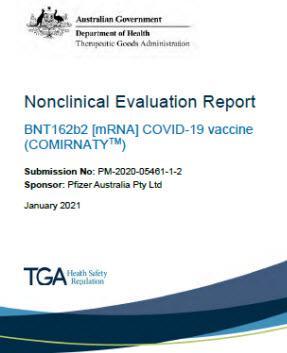More Videos on TGA FOI 2389 [Dr. John Campbell]
Summaries of two new videos posted today from Dr John Campbell and Professor Clancy on the TGA FOI 2389 document. He also posted a 3rd video on TGA FOI 2389 on biodistribution that I added to this post.
TGA document revelations
26 Mar 2023 YouTube
- Page 4 “Almost similar microscopic lung inflammation was observed in both challenged control and immunised animals (macaques) after the peak of infection (Days 7/8).”
- Challenged with infection (unvaccinated) control animals showed almost similar microscopic lung inflammation.
- Challenged with infection, immunized (vaccinated) animals also showed almost similar microscopic lung inflammation.
- Page 4 “There are no distribution and degradation data on the S antigen-encoding mRNA.”
- A new therapy that uses an intracellular pathway to use intracellular ribosomes.
- We know from page 45 that the lipid nanoparticles are systemically distributed, but the distribution of the spike protein that the RNA produces has not been tested. No data is available on how long the spike protein persists.
- Page 5 “Antibodies and T cells in monkeys declined quickly over 5 weeks after the second dose of BNT162b2 (V9), raising concerns over long-term immunity.”
- Page 6 – A few unknowns were identified by the TGA. “Short-term protection studies, lack of pharmacokinetic data for the S antigen-encoding mRNA (BNT162b2 V9), suboptimal dosing interval in the repeat dose study, lack of repeat dose toxicity studies in a second species, and genotoxicity studies with the novel excipients (a substance formulated alongside the active ingredients), and lack of studies investigating the potential for autoimmune diseases were noted.”
- Page 6 – Unknowns continue. “Long-term immunity and vaccine-induced autoimmune diseases were not studied in the nonclinical program.”
- Page 8 “BNT162b2 immunization also induced proinflammatory cytokines such as GM-CSF, TNF-α, IL-6, and IL-18, in addition to IFN-γ, in splenocytes.”
- Page 9 “One study found that among people who had recovered from COVID-19, 100% had S protein-specific CD4+ T cells in the circulation, and 70% had S protein-specific CD8+ T cells in the circulation.”
Professor Clancy responds to TGA document
26 Mar 2023 YouTube
- Discussion of a non-clinical evaluation report by the Therapeutic Goods Administration (TGA)
- Professor Robert Clancy has experience in submitting reports of this nature
- The TGA report is limited and leaves things out, and raises red flags that haven’t been picked up
- The same data is available worldwide where the vaccine would have been sold and reviewed by regulatory authorities
- Data has been obtained through Freedom of Information requests, but still quite a lot of it is redacted
- Genetic vaccines have been around for a long time, with little success until now
- Big companies have been waiting for an opportunity to develop and trial mRNA vaccines
- Robert is frustrated with the lack of comprehensive data on COVID-19 vaccines in animal models.
- He argues that the genetic information used to create COVID-19 vaccines is being injected throughout the body, raising potential health risks.
- Short-term studies show significant accumulation of vaccine components in certain organs.
- There is a lack of testing on potential long-term genetic problems, including the transmission of genetic changes to future generations.
- Robert suggests that studies on carcinogenesis and the potential for the vaccine to create cancer cells are necessary.
- Concerns about the lack of comprehensive data on the COVID-19 vaccine’s effects on animals and potential long-term genetic problems.
- The traditional definition of a vaccine involves an antigen from an infective organism or a treated whole organism, but the COVID-19 vaccine involves genetic information being injected to create cells to make the antigen.
- The vaccine’s messenger RNA can potentially be produced through every cell in the body, which raises all sorts of problems.
- Studies suggest that significant amounts of antigen are present in certain organs such as ovaries, adrenal gland, and liver.
- The lack of data on long-term genetic problems and carcinogenesis studies is concerning.
- There are reports of more cancer cases and potential triggers, and more research is needed to find answers.
- The vaccine’s selective accumulation in the ovaries may have an impact on reproductive health, with some animals experiencing implantation loss.
- Fatal abnormalities were observed in some animals in the injected group, and the numbers were different from those in the control group.
- The issues raised in the studies are flagged but not taken any further, and more research is needed to fully understand the vaccine’s effects.
- Does not believe that any new therapeutic should be given a pass without thorough testing, even if it is a variant of a well-known vaccine.
- The COVID-19 vaccines are a radically new type of therapy with genetic effects, and concerned that they are being treated as if they have been trialled for 100 years.
- The Australian government has invested 8 billion dollars in COVID-19 vaccines, a huge amount of money based on limited information.
- Did not see any demands for more animal studies or longer studies in the document produced by the Therapeutic Goods Administration (TGA) that approved the vaccines.
- Believes that the TGA has taken Pfizer at its word without demanding further assessments of pre-clinical and clinical data.
- Believes that the COVID-19 vaccines are a radically different new treatment that should not be treated as routine vaccines.
- Concerned that the COVID-19 vaccines were approved without evidence that they are any better or more quickly made than traditional antigen vaccines.
- Concerns about mRNA vaccines and their use in standard vaccinations for children
- Unresolved issues with cancer production, transmission, next-generation autoimmunity, and impaired immunity
- Variation in immune response due to different doses and controlled laboratory situations
- Random production of antigen based on biodistribution and cell membranes
- Precise dose-response curves not possible with immune response
- Net negative effect with too little or too much antigen, optimal zone in between
- Reduction of short-term antibody with multiple and high doses in animal studies
- Lack of connection between cytokine studies and observed immune response
- IL-10 is the dominant cytokine produced by T suppressor or T-reg cells, which turn off an immune response
- In a limited animal model, an increased dose of antigen turned off the immune response, consistent with their own studies showing a limited duration
- The study shows a limited amount of antibody response over a relatively short time frame
- IL-10 clinically reduces the amount of antibodies produced and reduces the number of T cells that are sensitized
- The IL-10 cytokine response goes up with an increased antigen load, which is what happens in humans with multiple vaccine doses
- The main regulator of the net immune response is IL-10
- The study shows a lack of control over the amount of antigen being injected
- There is no pre-clinical study on the amount of antigen in the messenger RNA vaccines
- There is no degradation data on the messenger RNA vaccines
- Radioactive lipid nanoparticles were found in the liver, adrenal gland, and ovaries
- There is a statistically significant greater loss of implantation, suggesting that the ovum isn’t quite up to it, in the animals given the messenger RNA vaccine
- There is no information on mucosal immunity in the discussed study
- Lack of difference in lung pathology between vaccinated and unvaccinated animals in viral challenge studies
- Monkeys are not good models for serious disease but show some change, with no significant difference between control and vaccinated
- Radiological evidence of protection claimed, but no significant difference found in CT scans at 10 days
- Vaccine-induced autoimmune diseases were not studied, a fundamental concern
- Lack of pharmacokinetic data on highly reactive genetic material being injected
- Antigens produced and immune responses are not studied
- Responsible organizations would release data as it comes out and recognize potential flags
- No recognition of potential flags, despite asking for billions in funding to develop messenger RNA vaccines
- Spike protein is self-toxic, a surprise discovery
All posts tagged “TGA FOI 2389“
THIS IS OUTRAGEOUS. This is a must-listen-to important speech by QLD GP Dr. Melissa McCann. UNBELIEVABLY TRAGIC & CRIMINAL. (Video ...
Summaries of two new videos posted today from Dr John Campbell and Professor Clancy on the TGA FOI 2389 document ...
Redacted information. Bureaucracy. Vaccine injuries. Ignoring patient data. TGA Conflict$ with BigPharma. ATAGI's admission about myocarditis. Novel technology on the ...
Concerns about 5 doses per vial with mRNA technology. Some people might get more/less microns than others. Two ingredients listed ...
No benefit in animal studies pre-approval. Antibody & T Cell response rapidly declines over 5 weeks. First 3 weeks counted ...
Safety testing skipped on toxicity, genotoxicity, carcinogenicity (cancer-causing), immunotoxicology, juvenile paediatric, novel excipients, vaccine-induced autoimmune disease. Senator Gerard Rennick just ...
C19 Injections can get Spike protein in any cell in the body (unlike the alleged 'Virus'), making it more infectious ...
Senator Gerard Rennick just walked through TGA’s Freedom of Information Act FOI 2389 with Dr John Campbell and it’s something ...
Australia is experiencing its highest mortality rate in over 80 years, our “reward” for obeying the "the Health Advice". Yesterday, ...
Living Document - First Published 8 April, 2022. Last Updated: June 2, 2022 This post is incomplete as the literature ...

Site Notifications/Chat:
- Telegram Post Updates @JourneyToABetterLife (channel)
- Telegram Chatroom @JourneyBetterLifeCHAT (say hi / share info)
- Gettr Post Updates @chesaus (like fakebook)
Videos:
References






